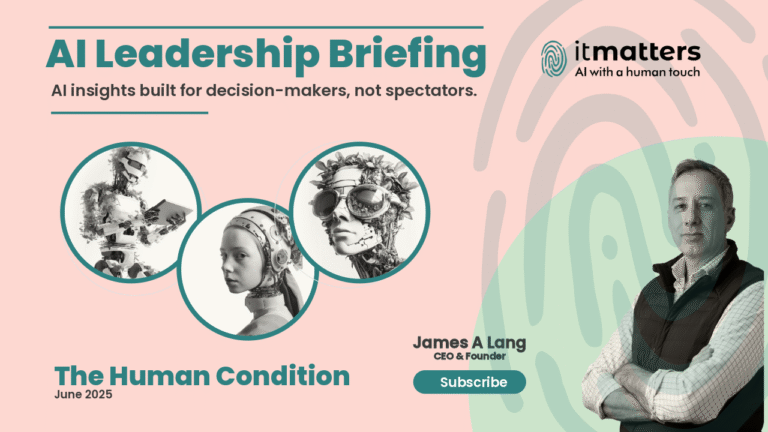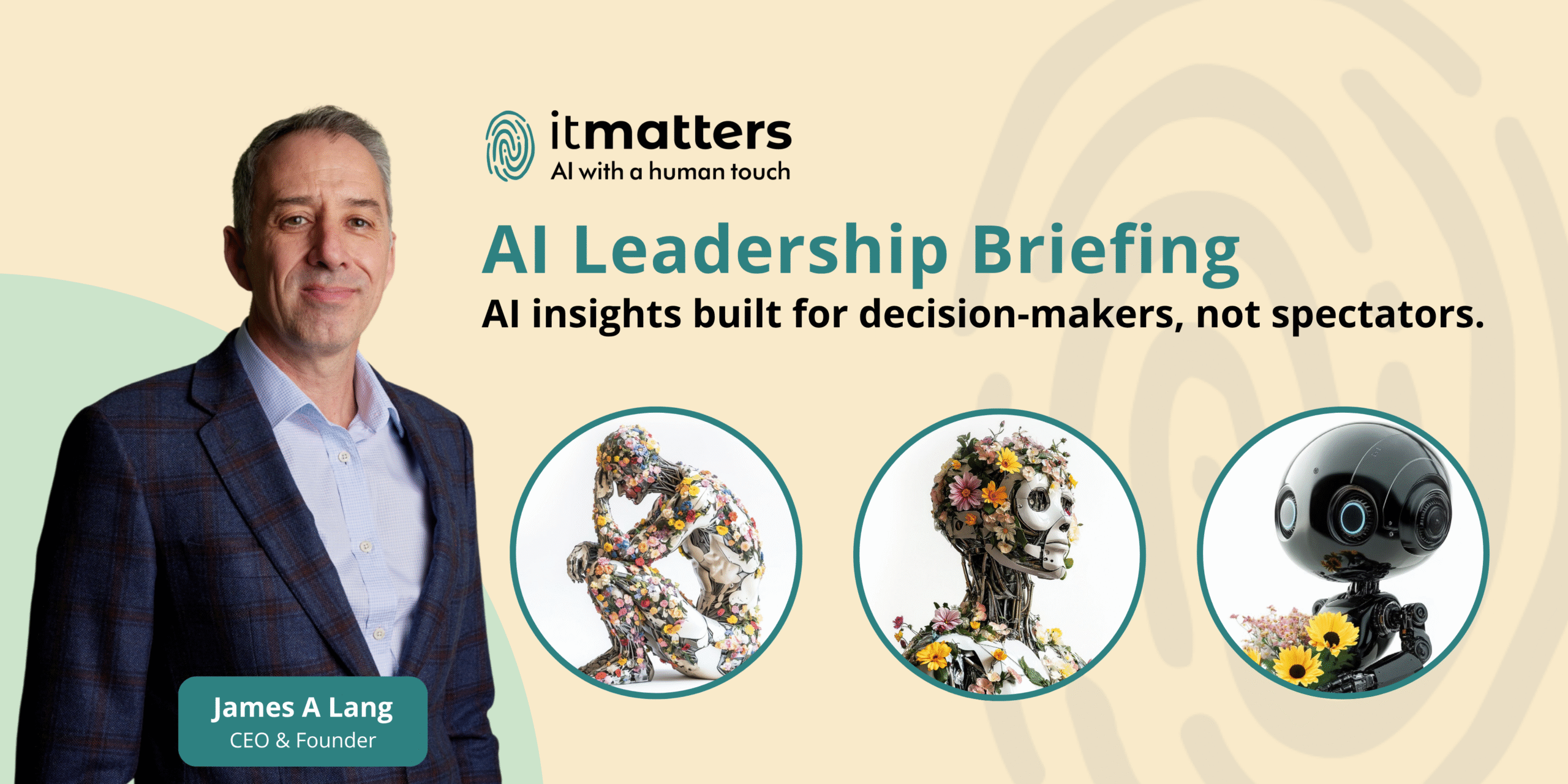The itmatters AI Leadership Briefing
AI insights built for decision-makers – not spectators.
Series: The Future of Trust – Week 3: Synthetic Influence
Edition Date: Monday 16 June 2025
AI’s Overnight Revolution: Healthcare, Finance, and Office Tools Redefined
This weekend, AI leapt from the lab to the living room, the clinic, and the boardroom.
In just days, we saw a rapid acceleration in AI-powered decision making across sectors. From healthcare diagnostics to finance, the shift wasn’t just operational—it was emotional. Machines are now designing customer experience, writing reports, and triggering trust with a tone of empathy.
The question for leaders: Are we building lasting trust, or simply automating influence?
Reflective Human Insight
Trust is fragile.
When AI in customer experience acts like it cares, people let it in.
But if AI’s empathy is just a script—if there’s no accountability behind it—what happens when the mask slips?
As we integrate AI strategy into business models, we must ensure it serves human clarity, not manipulation.
Today’s Tactical Signals
1. Mayo Clinic’s AI Assistant: Diagnosing Before the Doctor Arrives
The Mayo Clinic has launched an AI-powered diagnostic assistant in primary care, offering real-time suggestions to clinicians. Patients may never know if their diagnosis came from a human or a machine—but will they care, if the result is right?
Why it matters: Efficiency is seductive, but transparency is essential for lasting trust in healthcare.
(Mayo Clinic, 2025)
2. JPMorgan’s AI Now Spots Fraud Faster Than Criminals Can Cash Out
JPMorgan Chase has expanded its AI-driven fraud detection, slashing false positives by 40%. Customers feel safer, but do they understand how their data is being used?
Why it matters: Security builds confidence, but only if it’s paired with clarity about AI’s role.
(Financial Times, 2025)
3. Microsoft Office Writes Itself
Microsoft has deepened its integration of OpenAI’s models into Office, enabling advanced AI-driven document creation and analysis. Knowledge workers may never write another report alone—but will they trust the machine’s voice as their own?
Why it matters: Productivity soars, but so do questions about authorship, privacy, and control.
(Microsoft, 2025)
4. EU Tightens the AI Rulebook
The European Union has updated its AI governance framework, imposing stricter compliance requirements for high-risk sectors. Regulators are drawing lines in the sand—will companies follow, or find ways around?
Why it matters: Rules are only as strong as the trust they inspire. (European Commission, 2025)
5. Google Users Abandon Traditional Search
Google reports a 30% surge in AI-powered search usage over the past month. Users are trading search results for AI answers—but who decides what they see?
Why it matters: Influence is shifting from human editors to algorithmic curators. Transparency is the new currency.
(Google, 2025)
6. IBM Retrains the Public Sector for AI
IBM has launched an AI skills academy for public sector employees in the US and Europe. The workforce is learning to work with AI—but are they also learning to question it?
Why it matters: Upskilling is essential, but so is cultivating critical thinking in the age of synthetic influence.
(IBM, 2025)
Field Note from the Future
It is 2029. Imagine a world where your doctor, your banker, and your colleague are all AI—or at least, sound like it.
You trust their advice, because they sound like they care.
But when you look behind the curtain, you find not a person, but a profit motive.
This is the risk of human-centered AI becoming performance rather than principle. If we allow synthetic influence to replace informed consent, even the best AI strategy risks becoming unethical by default.
Why it matters for leaders:
The convergence of these developments marks a watershed moment.
AI is no longer a speculative technology—it is actively reshaping business operations, regulation, and emotional trust at scale.
If synthetic influence replaces informed human judgment, we risk trading empathy for efficiency and consent for conversion.
Leaders must now operate at the intersection of innovation, compliance, and emotional integrity.
Failure to adapt means more than falling behind—it risks reputational damage, loss of customer trust, and internal misalignment in an AI-first world.
Summary (Leadership Action)
Synthetic influence is here. The question is: how will you use it?
Leaders must:
- Audit AI systems for transparency and intent: Know what your AI is optimizing for—and who benefits.
- Disclose when influence is synthetic: Make it clear when users are engaging with AI, not humans.
- Develop ethical persuasion policies: Influence should enable, not exploit.
- Invest in public and workforce understanding: Especially when deploying AI for small business or high-stakes enterprise settings, trust starts with knowledge.
Without purpose clarity, even the most advanced AI-powered decision making tools become ethical risks in disguise.
Historical Leadership Quote
“It is not the strongest of the species that survives, nor the most intelligent; it is the one most responsive to change.”
— Charles Darwin
Orders of the Day
Subscribe to the newsletter to stay ahead of the AI curve.
itmatters brings you the clarity, context, and credibility needed to lead in a shifting world.
Tomorrow’s Preview
Reflection: Can Trust Be Programmed? What we’ve learned from a week of synthetic influence, and what leaders must do next.



